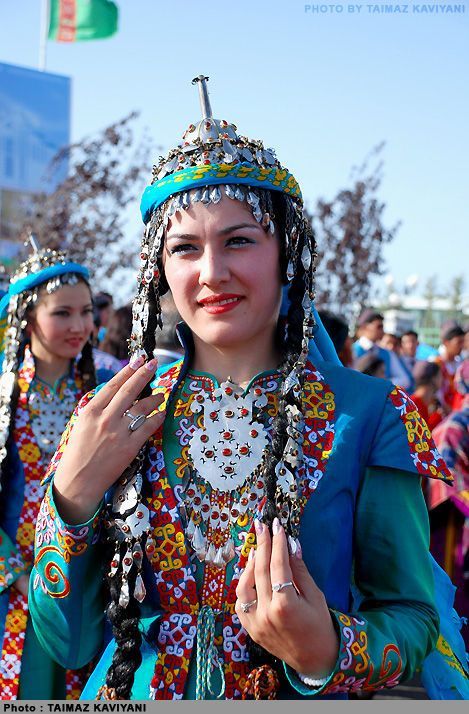#turkmenbashy
Text
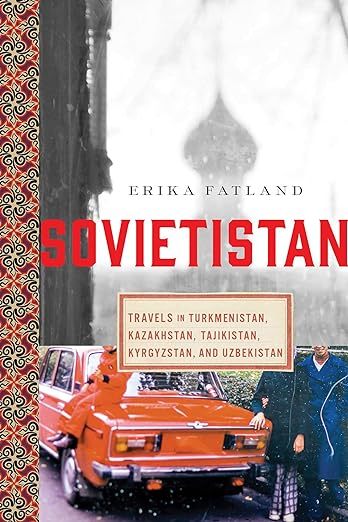
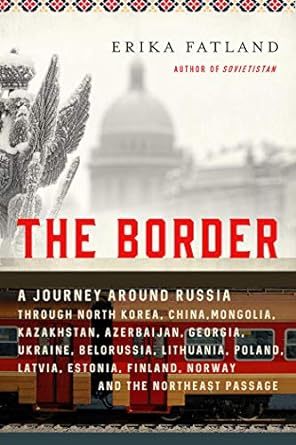
I've had these books sitting around for a couple of years now, but I finally picked up Erika Fatland's Sovietistan: Travels in Turkmenistan, Kazakhstan, Tajikistan, Kyrgyzstan, and Uzbekistan (BOOK | KINDLE | AUDIO) yesterday and I am burning through it and didn't even want to put it down long enough to post this. It's a good bet that any book that starts with a chapter about endlessly fascinating Turkmenistan and its crazy post-Soviet dictators -- the late, utterly ridiculous "Turkmenbashi" and the horse-obsessed dentist now in power -- is going to immediately capture my attention. The bizarre personality cults built around the dictators of Turkmenistan might actually be the one thing to shame Donald Trump because he'd be so envious of their audacity.
While I don't want my journey with Sovietistan to end as quickly as it's going to, I'm glad I also have Erika Fatland's book The Border: A Journey Around Russia Through North Korea, China, Mongolia, Kazakhstan, Azerbaijan, Georgia, Ukraine, Belarus, Lithuania, Poland, Latvia, Estonia, Finland, Norway, and the Northeast Passage (BOOK | KINDLE) ready to immediately dive into afterwards. I'm also going to need to get her newest book High: A Journey Across the Himalaya Through Pakistan, India, Bhutan, Nepal, and China (BOOK | KINDLE) to follow The Border. The author, Erika Fatland, is from Norway and speaks eight languages, so she's not completely lost in these wildly different and remote former Soviet satellite republics and her writing is vivid and funny (all three books are translated into English by Kari Dickson, so cheers to her, as well). I don't read a ton of books that fall in the genre of travel writing, but I might have to if there are more like this!
#Books#Book Recommendations#Book Suggestions#Erika Fatland#Sovietistan#The Border#High#Former Soviet Union#Soviet Union#Kazakhstan#Turkmenistan#Tajikistan#Kyrgyzstan#Uzbekistan#Travel Writing#Travel Writers#Former Soviet Republics#Turkmenbashi#Gurbanguly Berdimuhamedow#Saparmurat Niyazov#Dictators#Dictatorships#Personality Cults#Cults of Personality#Turkmen Dictators#Central Asia#History#Politics
31 notes
·
View notes
Text
Please reblog for a bigger sample size!
If you have any fun fact about Turkmenistan, please tell us and I'll reblog it!
Be respectul in your comments. You can criticize a government without offending its people.
70 notes
·
View notes
Text
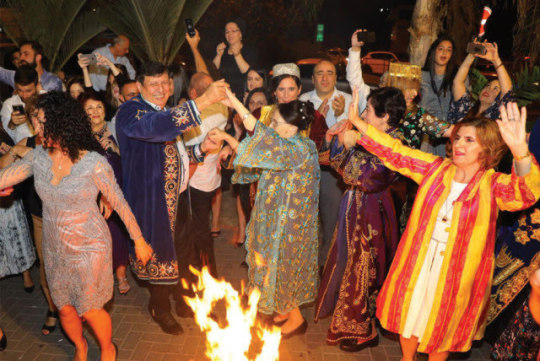
Turkmen Jews in Israel at a traditional pre-wedding Henna celebration, 2019
Archeological evidence of Persian Jewish presence in Turkmenistan dates back to the ninth century. At that time, the region was an important junction on the Silk Road trade route that connected Europe with Asia. Turkmen Jews adopted a lot of practices and customs from the surrounding environment, while some are unique to the community. During the 20th century, the Soviets effectively suppressed all Jewish culture in the Turkmen SSR, and it never recovered. Today, approximately 700 Jews live in Turkmenistan, primarily in Ashkhabad, Turkmenbashi, Mary, and Dashoguz. Many of them are Ashkenazim whose ancestors fled from Eastern Europe during WWII. A tiny group of Bukharan Jews live in villages on the border with Uzbekistan.
94 notes
·
View notes
Photo
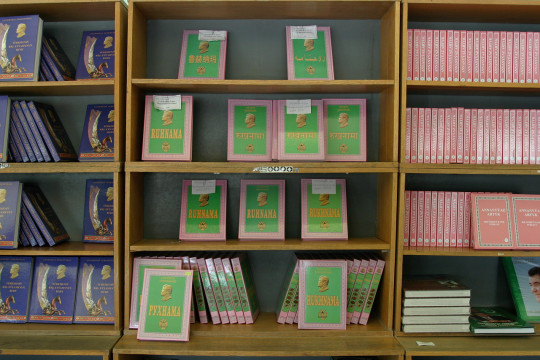
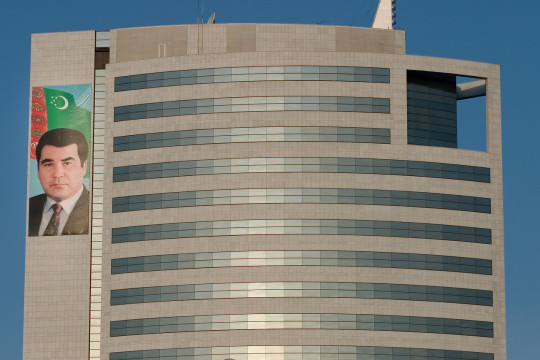
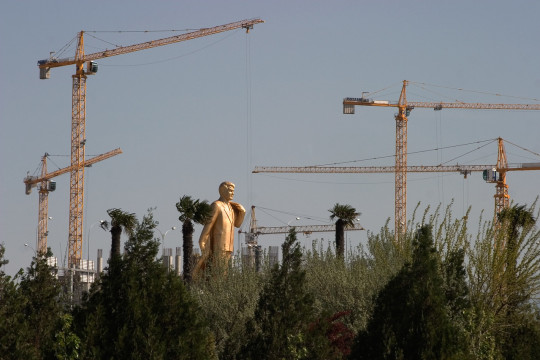
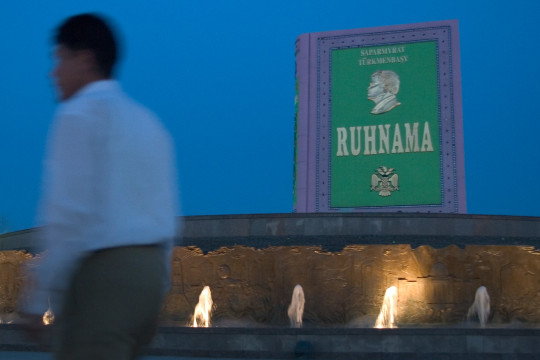
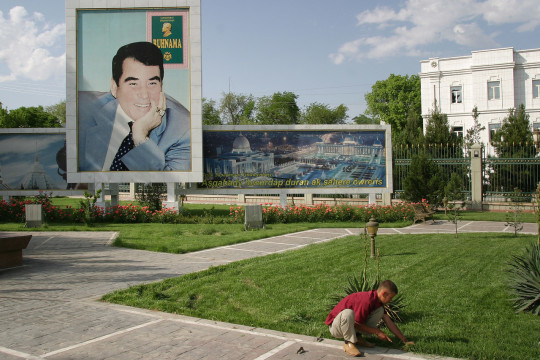
Ashgabat, Turkmenistan, 2005, from Turkmenbashi by Christopher Herwig (source)
81 notes
·
View notes
Text
[Eurasianet receives funding from the NED, OSF, the FCDO, & others]
Turkmenistan’s parliament does not do anything.
The only function it serves is to enable the dictatorship in charge to claim that it is presiding over a representative democracy. International partners do their bit in bolstering this fiction by engaging with the ersatz legislators as though they were the real thing.
None of this stops the Turkmen regime from constantly – and puzzlingly – fiddling with their only theoretically representative body.
On January 11, Gurbanguly Berdymukhamedov, the head of the upper house of parliament, the ex-president and de facto current co-president, suggested reverting from a bicameral setup back to a single-chamber parliament. This will bring a swift end to the experiment with bicameralism started two years ago.
This looks at first blush like a watering-down of the parliament, such as it was. If Turkmenistan was on a hypothetical trajectory towards something genuinely (if only very partially) representative, this development takes it in another direction. That direction being what Turkmenistan had prior to 2008.
It was in 2008, one year after Berdymukhamedov came to power following the death of his erratic and mercurial predecessor Saparmurat Niyazov, that a decision was adopted to scrap the Halk Maslahaty, or People’s Council, in the form in which it then existed. This 2,507-member body was comprised of the political elite, some supposedly elected members and the fulsomely bearded community elders that added much-needed color to the council assemblies that took place around once a year. The scale and diversity of the Halk Maslahaty was intended to convey the illusory impression that it was an accurate reflection of the population’s wishes. [...]
When Turkmenistan in 2020 switched to a bicameral system, which Berdymukhamedov argued would enable legislators to somehow better reflect the interests of local communities, the Halk Maslahaty label was lent to the new senatorial upper house. Prior to stepping down as president and handing the reins to his son, Serdar, in early 2022, Berdymukhamedov assumed the chairmanship of this newly formed Senate.
Now it turns out this will not do. Speaking at a joint session of parliament, Berdymukhamedov senior said members of the new-look Halk Maslahaty will include the president (his son), the Mejlis speaker, the chair of the Supreme Court, members of the cabinet and a whole array of other local government, national and parastatal apparatchiks. This body will have the authority to tinker with the constitution and decide major issues of domestic and foreign policy.[...]
In a parallel ongoing development, an election for the 125-member Mejlis has been scheduled for March 26. Local representative bodies, all the way through from regional- to village-level [!], will hold elections on the same day. None of it will mean much in practice.[...]
Abdrahmanov also announced that the Turkmenbashi refinery complex had begun producing what he termed B-92-grade aviation gasoline. [...] the state website described the development of this brand of fuel as a triumph for import-substitution [...]
17 Jan 23
16 notes
·
View notes
Text
It occurs to me that maymaygwashi rhymes with turkmenbashy
10 notes
·
View notes
Text
This is a real thing that's being discussed.
We should start calling him Trumpmenbashi.
#Donald Trump#Personality Cults#Cult of Personality#Authoritarianism#President Trump#Turkmenbashi#Turkmenistan#Saparmurat Niyazov#Dictators#This fucking country#Disgusting
10 notes
·
View notes
Text
Resolution A/RES/77/286 adopted by the General Assembly to designate November 26 as World Sustainable Transport Day.

The General Assembly,
Recalling its resolutions 69/213 of 19 December 2014, entitled “Role of transport and transit corridors in ensuring international cooperation for sustainable development”, its resolution 70/197 of 22 December 2015, entitled “Towards comprehensive cooperation among all modes of transport for promoting sustainable multimodal transit corridors”, its resolution 72/212 of 20 December 2017, entitled
“Strengthening the links between all modes of transport to achieve the Sustainable Development Goals”, and its resolution 75/313 of 29 July 2021, entitled “Strengthening the links between all modes of transport to ensure stable and reliable international transport for sustainable development during and after the coronavirus
disease (COVID-19) pandemic”,
Reaffirming the importance of timely implementation, in this decade of action and delivery for sustainable development, of the 2030 Agenda for Sustainable Development and the Addis Ababa Action Agenda of the Third International Conference on Financing for Development, and reaffirming also the Paris Agreement,
Reaffirming also its resolutions 53/199 of 15 December 1998 and 61/185 of 20 December 2006 on the proclamation of international years, and Economic and Social Council resolution 1980/67 of 25 July 1980 on international years and anniversaries, in particular paragraphs 1 to 10 of the annex thereto on the agreed criteria for the proclamation of international years, as well as paragraphs 13 and 14,
in which it is stated that an international year should not be proclaimed before the basic arrangements for its organization and financing have been made
Recalling the first United Nations Global Sustainable Transport Conference, held in Ashgabat, Turkmenistan, on 26 and 27 November 2016, and the second United Nations Global Sustainable Transport Conference, held in Beijing, China, from 14 to 16 October 2021, Recalling also its resolution 76/294 of 30 June 2022 entitled “Political declaration of the high-level meeting on improving global road safety”, in which it acknowledged the need to promote road safety and sustainable transport,
Noting the need for continued international cooperation to address the issues relating to transport and transit corridors as an important element of sustainable development and connectivity, and in this regard noting the related intergovernmental deliberations in the relevant international bodies and forums,
Recognizing the importance of addressing the particular vulnerability of landlocked countries, especially low- and middle-income countries, inter alia, by establishing and promoting efficient transit transport systems that link them to international markets, and in this regard reaffirming that the Almaty Declaration, the Vienna Declaration and the Vienna Programme of Action for Landlocked Developing Countries for the Decade 2014–2024 constitute a fundamental framework for genuine partnerships between landlocked and transit developing countries and their development partners at the national, bilateral, subregional, regional and global levels,
Noting in this regard the Ministerial Transport Conference of Landlocked Developing Countries, held in Turkmenbashi, Turkmenistan, on 15 and 16 August 2022, and its outcome document, the Awaza summary statement,
Stressing the importance of enhancing and linking the economies of small island developing States to regional markets and global supply chains, including by integrating them into existing and emerging maritime and multimodal transport and economic corridors, and encouraging sustainable transport initiatives, including in the context of the Small Island Developing States Partnership Framework,
Reaffirming the importance of timely implementation of the outcomes of the Fifth United Nations Conference on the Least Developed Countries, held in New York and in Doha, Qatar,
and the SIDS Accelerated Modalities of Action (SAMOA)
Pathway for small island developing States,
Recognizing the important role of safe, affordable, accessible and sustainable transport systems for all in supporting sustainable economic growth, improving the social welfare of people and enhancing international cooperation and trade among
countries,
Noting the importance of cooperation in enhancing transport connectivity through an integrated intermodal transport system by developing quality, reliable, sustainable and resilient infrastructure, exchanging best practices to optimize the development of interconnected highways, roads, streets, railways, waterways, airways, areas of modal transfer and ports, and by encouraging transport infrastructure construction and operations to minimize consumption of energy, land and other resources; generate lower emissions of greenhouse gases, ozone-depleting substances and other pollutants and ensure a positive social impact,
Recognizing the need for continued cooperation and coordination between the United Nations and existing partnerships on sustainable transport issues, such as the Global Partnership for Sustainable Transport, the Sustainable Mobility for All partnership, the Partnership on Sustainable Low Carbon Transport (SLOCAT) and the
Group of Friends of Sustainable Transport,
Decides to declare 26 November as World Sustainable Transport Day;
Invites all Member States, organizations of the United Nations system, international and regional organizations and civil society, including non-governmental organizations, individuals and other relevant stakeholders to mark World Sustainable Transport Day by means of education and the holding of events aimed at enhancing the knowledge of the public on sustainable transport issues, in
particular enhancing intermodal transport connectivity, promoting environmentally friendly transportation, developing socially inclusive transport infrastructure and other aspects of transport sustainability;
Invites the Department of Economic and Social Affairs of the Secretariat, in collaboration with the United Nations regional economic commissions, within their respective mandates, to facilitate the observance of World Sustainable Transport Day,
mindful of the provisions contained in the annex to Economic and Social Council resolution 1980/67;
Requests the President of the General Assembly to consider convening, through voluntary contributions and without duplication of effort, including activities within the decade of action and delivery for sustainable development towards the full
implementation of the 2030 Agenda for Sustainable Development, a half-day highlevel meeting, in collaboration with the Department of Economic and Social Affairs, in New York, during the seventy-eighth session of the Assembly, to promote sustainable transport cooperation in support of the implementation of the 2030
Agenda, the Paris Agreement, the New Urban Agenda
and the political declaration of the high-level meeting on improving global road safety;
Commits to enhancing the role of sustainable transport and mobility in job creation, mobility facilitation and improvement of the efficiency of logistics chains in connecting people and communities to jobs, schools and health care and in the
delivery of goods and services to rural and urban communities, thus providing all with equal opportunities and leaving no one behind;
Emphasizes the contribution of sustainable, low-emission and energyefficient modes of transport to climate change mitigation and adaptation and the achievement of the Sustainable Development Goals, as well as the importance of long-term strategies and multi-stakeholder partnerships in delivering such sustainable modes of transport;
Encourages the organizations of the United Nations system and other international organizations, relevant international and regional financial institutions, multilateral and bilateral donors and the private sector to further coordinate their efforts and to collaborate in mobilizing financial and technical assistance to countries, in particular developing countries, for strengthening the link between all mode s of transport to achieve the Sustainable Development Goals;
Requests the Secretary-General to bring the present resolution to the attention of all Member States, organizations of the United Nations system and other international and regional organizations, as well as civil society, including non-governmental organizations and individuals; Stresses that the cost of all activities that may arise from the implementation of the present resolution should be met from voluntary extrabudgetary contributions. 70th plenary meeting.
#paris agreement#financing for development#agenda 2030#Sustainable Transport#resilient infrastructure#resolutions#united nations general assembly#efficient transit transport systems#inter-island connectivity
0 notes
Text
youtube
ASHGABAT: a cidade branca no DESERTO! | TURCOMENISTÃO 02
Conheça ASHGABAT, a cidade de mármore branco no meio do deserto!
Explore os monumentos mais bizarros do mundo e as curiosidades do governo de Turkmenbashi e seu sucessor!
via YouTube https://www.youtube.com/watch?v=YpCeimG8J9M
0 notes
Photo
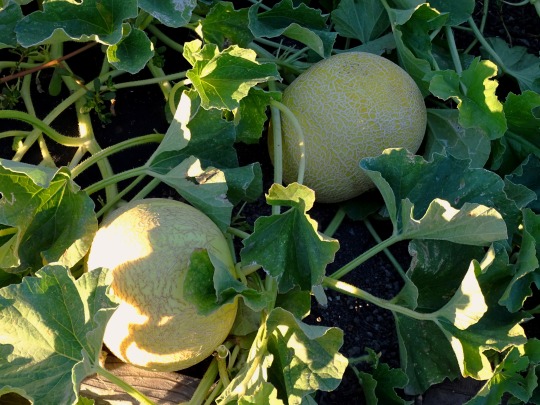
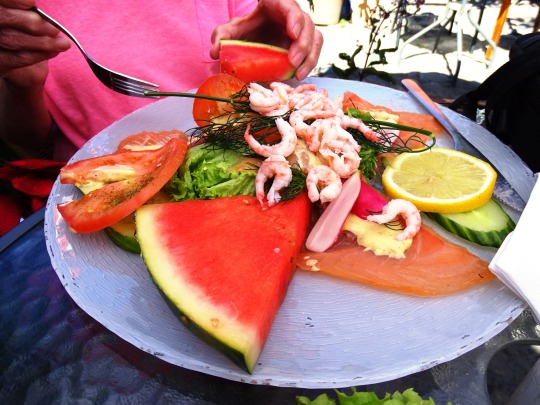
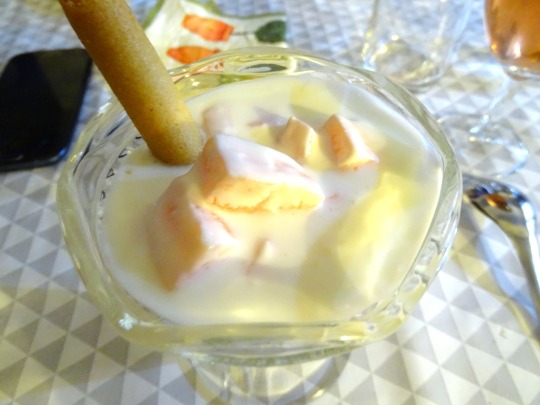
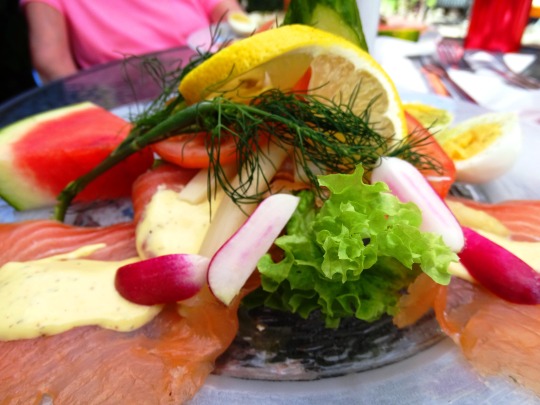

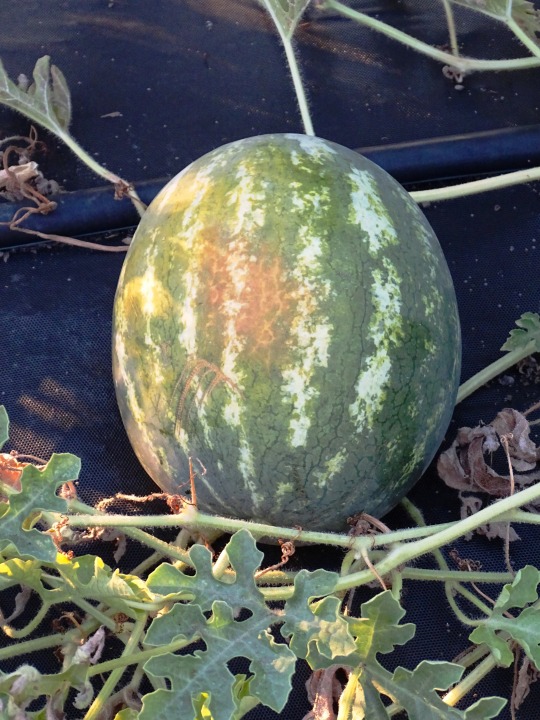
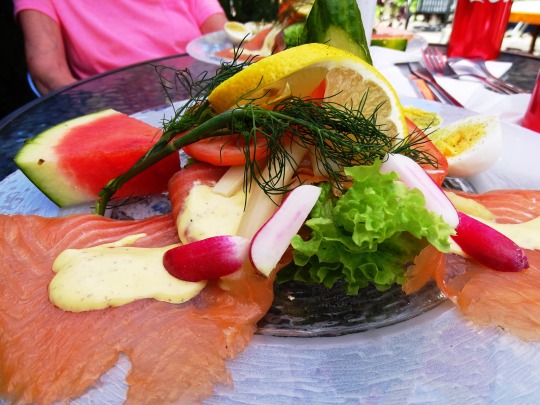

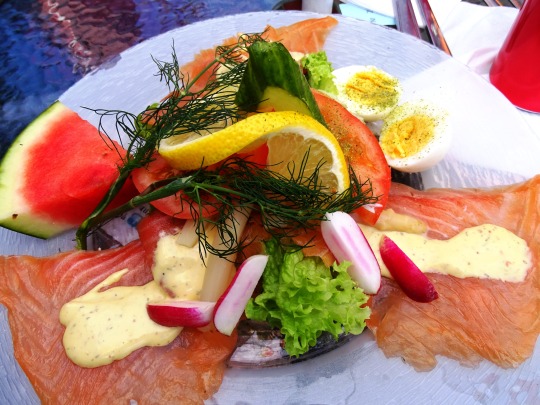
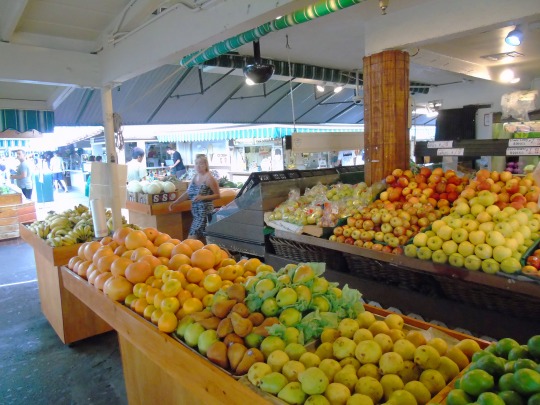
Melon Day
Melon Day takes place on the second Sunday in August. This year, it takes place on August 13. On this special day, we celebrate cantaloupes, galias, and all the other muskmelons, specifically those belonging to the people of Turkmenistan. If you’re like us, you may have confused watermelons for melons at least once in your life, however, these two fruits are very different even though they stem from the same family. Melons, particularly muskmelons, have an important agricultural heritage and are the pride of the people of Turkmenistan, a country located in Central Asia. Today, they honor not only their well-groomed muskmelons but a fine crossbreed, named after their first president, the Turkmenbashi melon.
History of Melon Day
They are hard, musky, and netted on the outside, but soft, succulent, and orange or white on the inside. Today, all the hype is about muskmelons, these juicy fruits that are not to be confused with any other kind of melon. We often find ourselves placing all melons in the same category, but this is an oversight on our part. Muskmelons are quite different from all other melons, and this can be attributed to their physical features and taste. They typically have smooth, ribbed, wrinkled, or netted exteriors with sweet flesh that is yellow or white. Some examples of muskmelons are cantaloupes, honeydews, and galias.
Although we are celebrating all kinds of muskmelons today, Melon Day originated in Turkmenistan and holds cultural significance for its people. For those who may not know, Turkmenistan is the least populated country found in Central Asia. They are known for their beautiful culture, heritage, and also their delicious melons. Turkmenistan is responsible for approximately 400 of the melon varieties we have today. They grow and cultivate muskmelons in great numbers, and this has been an integral part of their history and culture for decades.
Melons hold such importance that one of the crossbreed products is named after their first president, Saparmurat Niyazov, who is also the creator of this holiday. He preferred to be known as ‘Turkmenbashi,’ which means ‘leader of the people.’ The Turkmenbashi melon is revered for its aroma, taste, and hefty size.
Melon Day timeline
2400 B.C.Picture Perfect
The first record of muskmelon is traced back to this time, on an Egyptian picture of funerary offerings.
500 A.D. — 1500 A.D.Melons Travel North
Muskmelons are introduced to China and other Asian countries in the Middle Ages.
1994The Best Muskmelons
The first president of Turkmenistan, Saparmurat Niyazov, establishes Melon Day.
2004A Fruit of Paradise
The president of Turkmenistan refers to the Turkmen melons as the source of their pride and as a fruit of paradise in his address to farmers.
Melon Day FAQs
Is Melon Day a public holiday?
Melon Day is a national, public holiday in Turkmenistan. Although this holiday is now acknowledged in a few other countries, it only remains a public holiday in its founding federation. Citizens are not required to go to work or school on this day and are encouraged to join in the holiday’s festivities.
Why are they called muskmelons?
Muskmelons were given their name based on their aroma. These fruits have a particularly flavorful smell when ripe. ‘Musk’ is the Persian word for ‘perfume’ and is the perfect description for the sweet aroma of ripe muskmelons.
Are all muskmelons sweet?
Muskmelons have hard, smooth, ribbed, or netted skin with a flavorful musk-like taste and aroma. Their flesh is sweet-tasting and often orange in color with high water content and nutritional value.
Melon Day Activities
Eat a muskmelon
Make something with a muskmelon
Attend the festival
How else can you celebrate Melon Day, other than by eating some delicious melons? Casaba, canaries, and honeydews are a few of the sweet possibilities you can enjoy on this holiday, and remember to share them with your family and friends.
Muskmelon can be eaten in several ways. One way is by including it in desserts. You can make melon boats, fruit salads, and a traditional Chinese dish called Glutinous Rice Fresh Melon and Coconut Roll. Go online and see what tasty dessert you could make today with one, two, or even three varieties of muskmelon.
If you find yourself in Turkmenistan on Melon Day, join in for the festivities! The people organize several festivals, events, and even competitions to commemorate their cultural holiday. You can also take some time out, explore, and see what the city has to offer.
5 Fun Facts About Cantaloupes
It’s named after a city
Low in calories, high in vitamins
They win the popularity contest
They have flowers
Ripe ones are easy to detect
The name ‘cantaloupe’ was derived from Cantalupo, Italy, which was the first place where the seeds arrived from Armenia in the 16th century.
An average-sized cantaloupe will have just approximately 100 calories and contain a bounty of vitamins.
Cantaloupes are the most popular melons in America.
Cantaloupe plants produce small yellow flowers while developing.
When a cantaloupe is ripe, its vines simply detach from the fruit and its rind and the netting turns beige or cream underneath.
Why We Love Melon Day
It’s a delicious holiday
It encourages us to eat fruits
It’s part of Turkmenistan’s cultural heritage
Who doesn’t love a holiday where we can indulge in sweet-tasting melons eaten on their own or as part of a dish or dessert — the flavorful options are endless!
Many of us don’t eat as much fruit as we should, but a holiday like this allows us to have our fill. This day encourages us to eat more fruits, and not just any fruit, but one of the sweetest you could come across — muskmelons.
This holiday is not only important to the history, culture, and people of Turkmenistan, it was also established by them. Melon Day allows us to appreciate the wonderful fruit, gives us a sneak-peek into Turkmenistan culture, and allows us to learn more about the people.
Source
#Brix Restaurant & Gardens#watermelon#sour cream with melon#dessert#melon ice cream#Bellinzona#gelateria#Salmon & shrimps Smörrebröd#fruit#Sweden#Farmer's Market#original photography#travel#vacation#USA#Switzerland#Melon Day#second Sunday in August#13 August 2023#I don't like watermelons#food#restaurant
0 notes
Text
A voice for the forgotten states in contemporary international relations
When one speaks about international politics and its main players, many would answer with China, the US, Russia, or Japan, just to name a few. People tend to forget about countries who have small populations, a somewhat unnoticeable history, and countries who have not had an influence on Western countries. We have an inclination to overlook other countries who are equally important in contemporary international relations simply because they do not garner the same amount of attention in our media. Smaller, less powerful countries, especially when the location of that country is in a strategic zone, deserve the same, if not more attention from us. Many of these more “forgotten” countries are not only being exploited by other countries, but its citizens are also experiencing grave human rights violations. It is therefore crucial that not only do key international organizations allot additional attention to these nations, but also civil society as well. This article will analyze one particular “forgotten” country in Central Asia, providing insight into the grave human rights violations of the freedom of press and freedom of movement occurring there, and why the international community should retaliate against these violations.
One of the many “forgotten” countries in the world is Turkmenistan, a country with a population of around six million people and a surface area of around 488,200 km², located in the landlocked Eurasian landmass of Central Asia. Situated in the east of the Caspian Sea, the large yet mysterious country with its impressive landscape filled with desserts, dotted with oasis, and with the Kopet Dag mountain range along the southern border with Iran, is not the typical country one visits for vacation. Not only is this due to the insufficient travel corridors and lengthy and tedious visa process that requires a letter of invitation, but because Turkmenistan is a country known for its strict laws and being a frequent violator of the human rights of its citizens. It is a repressive authoritarian state where civil liberties and political rights are almost completely denied in practice. All aspects of public life are controlled by President Gurbanguly Berdymukhamedov, also known as “Turkmenbashi” or “Father Protector” and his associates, elected through tightly controlled elections, ensuring an almost unanimous victory for them every year. While the regime’s human rights violations have been noticed by organizations such as the UN, EU, and OSCE, little has been achieved in shedding light on the dire situation there. So, what are the human rights that are being violated in Turkmenistan, and why would we be so unwise to ignore them?
A fight for a voice: Lack of media and information freedom
The control over media and information is not a rare occurrence as countries such as China, Russia, North Korea, and even the US, being some of the most powerful countries in our modern discussion of contemporary international relations and diplomacy, continue to violate this freedom. Freedom of the press is a highly important aspect in one’s life, and is taken for granted by many of us living in countries where there is a significant level of media freedom. But why is the freedom of press of such vital importance? For one thing, it disarms the government from exploiting its power as the press acts as a bridge between powerful entities such as governments and people. If there is no freedom with the press, it merely serves as an extension of that power. Turkmenistan ranks as one of the lowest countries in terms of freedom of media and information standing at 178th out of 180 on the World Press Freedom Index. For example, apart from North Korea, Turkmenistan is the only other county not to have acknowledge any Covid-19 cases within its borders. Moreover, the government in Turkmenistan controls all media and its citizens are only able to access a very limited, highly-censored version of the internet, removing most satellite dishes using the justification of making the cities more visually appealing and thus depriving the public of access to uncontrolled news coverage. For example, the 2004 “Rose Revolution” of Georgia was not reported in the official media in Turkmenistan due to the fact that the revolution consisted of protests which successfully changed the country from an autocracy to a democracy.
To know more: https://peaceforasia.org/turkmenistan-a-case-study/
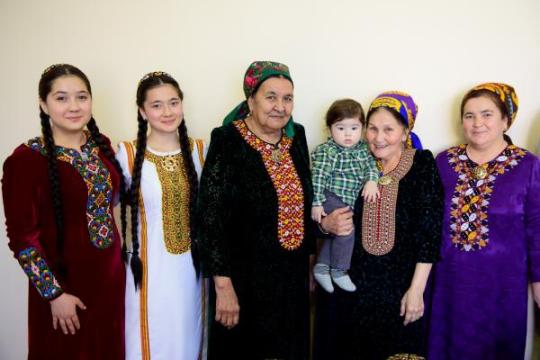
0 notes
Photo
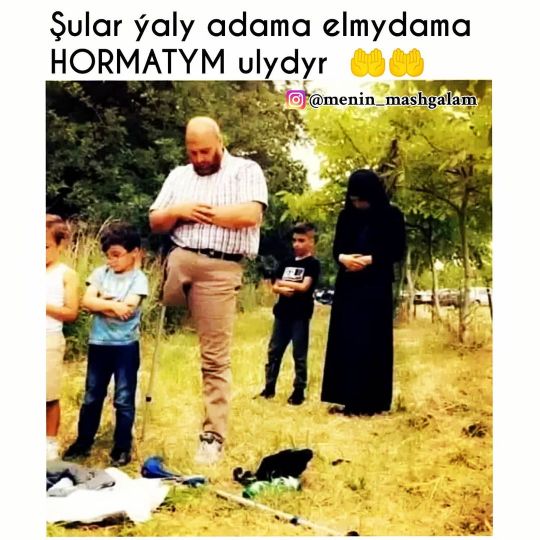
ŞULAR ÝALY ADAMA ELMYDAMA HORMATYM ULYDYR 🤲🤲 . . . @menin_mashgalam . . . #meninmashgalam #mary #balkan #ashgabat #dashoguz #lebap #ahal #turkmenabat #balkanabat #ashgabat2017 #sözlerim #turkmenbashy #turkmenistan🇹🇲 #turkmenim #turkiye #russiya #blogger #like #follow #beğeni #sozler #love (Ashgabat, Turkmenistan) https://www.instagram.com/p/CEdk5ejj0VQ/?igshid=1obc7eaige6vo
#meninmashgalam#mary#balkan#ashgabat#dashoguz#lebap#ahal#turkmenabat#balkanabat#ashgabat2017#sözlerim#turkmenbashy#turkmenistan🇹🇲#turkmenim#turkiye#russiya#blogger#like#follow#beğeni#sozler#love
0 notes
Text
[Eurasianet receives funding from the NED, OSF, the FCDO, & others]
The president of Uzbekistan is now Professor Shavkat Mirziyoyev. Mirziyoyev earned that honorary title during his tour of the Magtymguly Turkmen State University in Ashgabat, which he visited on October 21.
The Uzbek leader’s trip to Turkmenistan is only more evidence of the warmth between two nations that have at times in their post-independence history regarded one another with suspicion.
The headline takeaway from Mirziyoyev visit was the proclamation that Turkmenistan and Uzbekistan have established an “in-depth strategic partnership” and agreed to hold regular high-level meetings. One aspect of this partnership is the mutual recognition of “the inviolability of [one another’s] borders,” which is no small matter since border demarcation is still an ongoing process.
On a more immediate matter, Berdymukhamedov and Mirziyoyev took part via videoconference in the foundation-laying ceremony of a free trade zone in a location along the border of Turkmenistan’s Dashoguz province and Uzbekistan’s Khorezm province.[...]
“At the current rate … [Uzbekistan’s] gas reserves will be depleted in less than 20 years, while the government foresees natural gas demand rising by 30 [percent] to 65 [billion cubic meters] by 2030,” the IEA concluded.[...]
One item that Uzbekistan will be eager to begin importing from Turkmenistan in short order is gas. [...]
It is thus that Turkmenistan is trying to assume the role of energy supplier to the region.
When Berdymukhamedov went on his first-ever state visit to Kazakhstan earlier this month, his host, President Kassym-Jomart Tokayev, talked about his country’s interest in reaching a long-term agreement to import 1.5 billion cubic meters of gas per year from Turkmenistan. [...]
This vision has hit some speedbumps along the way, though. When Kyrgyz President Sadyr Japarov went to Ashgabat in June 2021, he came away with a provisional deal for Turkmenistan to supply his country with gas in the fall-winter period. Deputy Kyrgyz Energy Minister Taalaibek Ibrayev revealed this April, however, that this deal ultimately fell flat because it was “economically unprofitable.” [...] The 270 million cubic meters that Kyrgyzstan had contracted to import from Turkmenistan was delivered to Uzbekistan, which in turn used that fuel to generate power. Kyrgyzstan thus indirectly received that energy in the form of 1.3 billion kilowatt hours of electricity from Uzbekistan[...]
On October 24, Berdymukhamedov headed west to the Caspian coast to oversee a military readiness drill involving ground, air and navy forces. [...]Jet fighters, cargo planes, and combat helicopters took off from the international airport in the city of Turkmenbashi for the viewing pleasure of Berdymukhamedov, who is formally supreme commander of the armed forces, despite having no known experience in military service. One of multiple highlights of the drill was an exercise in directing an armed Turkish-made Bayraktar TB2 UAV toward a target by means of the TürkmenÄlem satellite, which is operated by Turkmenistan’s National Space Agency.[...]
Turkmen exercises like this one are most notable for mainly envisioning the prospect of conflict not with an irregular militant force, but a full-fledged army from a foreign nation. Quite which possible antagonist Ashgabat has in mind is not immediately obvious[...]
In an October 22 meeting dedicated to discussing public administration reforms, Finance and Economy Minister Mukhammetgeldy Serdarov talked up the savings that had been made through a recent merger of districts and villages.[...]
This meeting, incidentally, was chaired by Gurbanguly Berdymukhamedov, the former president and father of the current incumbent, ostensibly in his capacity as chair of the upper house of parliament.
26 Oct 22
3 notes
·
View notes
Text
somthing wrong wit me. pray for me bros this pain is horrendous
#seeing dr in a couple days if its a spleen thing im sure itll be apparent before then#+i had a listen with my parents stethoscope and it sounds ok in there so prob not collapsed lung#ive had this persistent cough for months (its not le virus) so i amworried its related to that#hurts like an absolute bitch wheni cough#who knows though maybe im miles off and i have kidney cysts again.#im just being dramatic dw its almost certainly just a sprain of the muscles around my ribcage#it sucks though if i move wrong or cough too hard i literally see stars from the pain#has anyone had. that sort of injury before? its a longshot but if you have advice i welcome it lol#kind of worried because theres significant rebound tenderness in the area#welp if i get a fever ill know for sure#i have no idea what caused it too#save me turkmenbashy
17 notes
·
View notes
Video
Great Kyz Kala, Turkmenistan
#Turkmenistan#Ashgabat#Arp Arslan theatre#National museum#walk of health#Old Nisa#Tolkochka Bazaar#Gypjak#Three Leg Monument or Neutrality Ark#Monument of Turkmen Horses#Altyn Asyr (=golden age) shopping center#Archabil str. by night#Lenin’s statue#Turkmenabad#Armu-Darya river#trans Caspian railway#ex president Saparmurat Niyazov aka Turkmenbashi#Ruhnama#Mary#ancient Merv#Tejen#Carakum desert camels#Darvaza (Gate aka the Gate of Hell) natural gas burning crater#Mausoleum of Muhamed ibn Zaydand#Great Kiz Kala or Erk Kala (Maiden`s castlle)#Lesser Kiz Kala#Sultan Sanjar Mausoleum#Gyaur Kala (=Castle of the Infidels)#Ruins of Abiwerd#Turabek-Khanum Mausoleum in Kunya
65 notes
·
View notes
